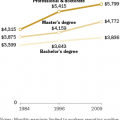
Teaching kids about money can sometimes be hard, but they need to learn early about finances. Here are some easy methods that work.
Younger teachers are more likely than older ones to want personal finance taught in elementary school, a new report has found.
The report, “Bridging the Financial Literacy Gap: Empowering teachers to support the next generation,” found that 62 percent of millennial (born in 1980 or after) educators support adding financial literacy education to the curriculum compared with 51 percent of non-millennials. They also are twice as likely as their older peers to seek grants to help fund financial education programs.
The report by the accounting firm PwC (PricewaterhouseCoopers) was somewhat surprising based on previous research that shows millennials have lower financial literacy than any other generation. A PwC report released in January found that nearly 30 percent of millennials bounce their checkbooks and more than three-quarters have long-term debt.
Still, the report may underscore beliefs by some young teachers that the next generation needs a better grasp of money issues than they had.
You Might Also Enjoy: Americans Feel ‘Pretty Good’ About Finances
Addressing the lack of financial literacy among young people has become a priority for many state and federal agencies. Nationwide, 17 states require students to take a personal finance class, and five require a semester of financial education.
Research commissioned by the U.S. Consumer Financial Protection Bureau found that while financial literacy classes don’t necessarily lead to better money decisions, they do show students how to find the financial information they may someday need. The classes also encourage students to study money matters on their own by following the stock market or comparing credit card offers.
Other research has found that requiring more math in high school results in better credit, higher returns on investments and fewer home foreclosures. Financial education experts recommend math teachers develop lessons about money, such as budgeting or calculating compound interest.
While a class about home mortgages might not be relevant to high schoolers, a class on college loans or credit scores would be. Similarly, students heading off to college might appreciate knowing the difference between a credit card and a debit card, and the basics of setting up a bank account.





